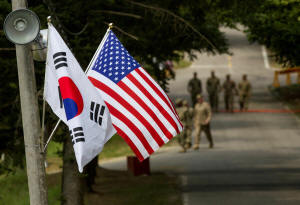China looms large as S.Korea presidential hopefuls meet U.S. diplomat
 Send a link to a friend
Send a link to a friend
 [November 10, 2021]
By Hyonhee Shin and Josh Smith [November 10, 2021]
By Hyonhee Shin and Josh Smith
SEOUL (Reuters) - A senior U.S. diplomat
will meet newly selected presidential candidates in South Korea this
week, ahead of next year's election that will shape the future of
relations between the two allies.
U.S. Assistant Secretary of State for East Asian and Pacific Affairs
Daniel Kritenbrink was due to arrive in Seoul on Wednesday, with plans
to hold separate talks with ruling Democratic Party candidate Lee Jae-myung,
and Yoon Suk-yeol of the main opposition People Power Party.
While domestic issues such as housing prices are expected to dominate
the March 9 election, analysts say the result will also shape South
Korea's balancing act between China and the United States, and how South
Korea coordinates with its U.S. ally on North Korea.
"With the partisan split on the issue of U.S.-China relations, the
upcoming election will determine how South Korea balances between the
U.S. and China in the next five years,” the Washington-based Stimson
Center think tank said in a recent report.
U.S President Joe Biden's administration has been focused on marshalling
Asian alliances to counter what it has called potential "coercion and
aggression" by China.

That represents a challenge for South Korea, which is not eager to
provoke China - its largest economic partner.
South Korea paid a heavy economic price when China retaliated over the
2017 deployment of a U.S. missile defence system in South Korea. South
Korea's deep reliance on China was further highlighted this week by a
critical shortage of urea , an additive used in diesel vehicles to
reduce emissions, after China tightened exports.
Democratic Party candidate Lee has argued that there is no need for
South Korea to limit itself by choosing between China and the United
States, as they become increasingly competitive.
"I wish our country would take the path where we are not unilaterally
swayed, abandoned or excluded by either side, and I am confident I can
do that," he told reporters on Wednesday.
"If you ask me to choose between the United States and China, I would
say there aren't only two options for us to choose," he said.
In a display of his balancing policy, Lee's campaign said he had
scheduled talks with the Chinese ambassador just after his meeting with
Kritenbrink on Thursday. Yoon's campaign said it has not yet scheduled a
meeting with Chinese officials.
The United States is South Korea's largest and oldest ally, and stations
about 28,500 troops in South Korea as part of efforts to deter North
Korea since the 1950-1953 Korean War.
[to top of second column]
|

South Korean and American flags fly next to each other at Yongin,
South Korea, August 23, 2016. Picture taken on August 23, 2016.
Courtesy Ken Scar/U.S. Army/Handout via REUTERS

NORTH KOREAN TIES
On the U.S. missiles that angered China, Lee said it was hard to see
them as completely in South Korea's interest, but since they were
already deployed, he would work to resolve any issues with them in
place.
The conservative Yoon has signalled he would take a more openly pro-U.S.
stance, and has called for Seoul to be less ambiguous in its
relations between Washington and Beijing.
The conservatives have signalled they could be open to officially
joining the Quad, a diplomatic group that includes the United
States, Japan, Australia and India.
Over the summer, Yoon became embroiled in an unusual public debate
with China’s ambassador over comments about the U.S. missile defence
system.
The dispute, which played out in duelling newspaper articles, drew a
warning from South Korea's foreign ministry which told the Chinese
ambassador to "exercise discretion" when commenting on the country's
politicians, media reported at the time.
On North Korea, neither candidate takes a stance that would
represent a drastic shift from the status quo, with both saying they
would be willing to meet North Korean leader Kim Jong Un and seek to
improve relations.
Lee has said he wants to approach North Korea from a “practical”
standpoint, using language that echoes the Biden administration.

But Yoon may be closer to the U.S. position in his demand that any
economic cooperation between the two Koreas be contingent on the
North’s progress toward denuclearization.
(Reporting by Josh Smith; Editing by Robert Birsel)
[© 2021 Thomson Reuters. All rights
reserved.] Copyright 2021 Reuters. All rights reserved. This material may not be published,
broadcast, rewritten or redistributed.
Thompson Reuters is solely responsible for this content. |